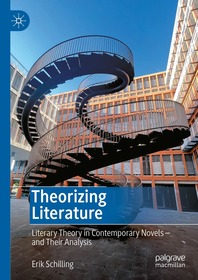
Theorizing Literature
Literary Theory in Contemporary Novels – and Their Analysis
- Publisher's listprice EUR 117.69
-
48 811 Ft (46 487 Ft + 5% VAT)
The price is estimated because at the time of ordering we do not know what conversion rates will apply to HUF / product currency when the book arrives. In case HUF is weaker, the price increases slightly, in case HUF is stronger, the price goes lower slightly.
- Discount 12% (cc. 5 857 Ft off)
- Discounted price 42 954 Ft (40 909 Ft + 5% VAT)
Subcribe now and take benefit of a favourable price.
Subscribe
48 811 Ft

Availability
printed on demand
Why don't you give exact delivery time?
Delivery time is estimated on our previous experiences. We give estimations only, because we order from outside Hungary, and the delivery time mainly depends on how quickly the publisher supplies the book. Faster or slower deliveries both happen, but we do our best to supply as quickly as possible.
Product details:
- Edition number 2024
- Publisher Springer Nature Switzerland
- Date of Publication 8 July 2024
- Number of Volumes 1 pieces, Book
- ISBN 9783031533259
- Binding Hardback
- No. of pages207 pages
- Size 210x148 mm
- Language English
- Illustrations XIII, 207 p. 10 illus. Illustrations, black & white 577
Categories
Long description:
This book offers an analytical model for the interpretation of theory-informed novels – American, English, French, German, and Italian – from the past 50 years. Works discussed include Laurent Binet’s The 7th Function of Language, Italo Calvino’s If on a Winter’s Night a Traveler, Patricia Duncker’s Hallucinating Foucault, Umberto Eco’s Foucault’s Pendulum, David Lodge’s Small World, and Juli Zeh’s Dark Matter. Erik Schilling shows how these works not only incorporate elements of theory in playful, intertextual ways, but productively work with theory – for instance, by elaborating the complexities of the roles of author and reader or by confronting the quest for meaning with an infinite network of signs. Schilling argues that the novels do not merely adopt theory; they create theory – and this theorizing literature requires new forms of interpretation.
Table of Contents:
1) Introduction.- 2) Second-order literary theory.- 3) Narrating literary theory.- 4) The fragile relationship of author, reader, and Text.- 5) Topics in/of theory.- 6) Creating and interpreting fictional worlds.- 7) Beyond novels – beyond theory?.- 8) Extrapolating theory from literature.- 9) Bibliography.




